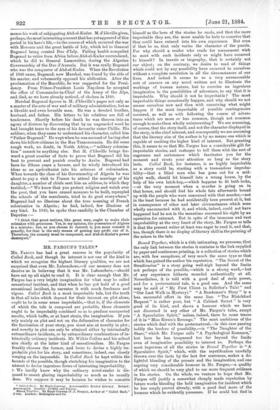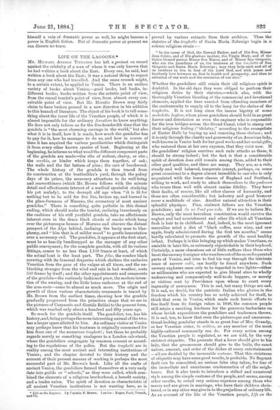MR. FARGUS'S TALES.*
FARGIIS has had a_ great success in the popularity of Called Back, and though its interest is not one of the kind in which we recognise the highest literary qualities, we are not surprised that even Mr. Labouchere,—if our memory does not deceive us in believing that it was Mr. Labouchere,—should have sat up all night to read it. It is clear enough that Mr. Fargus has a very bright imagination for what may be called sensational incident, and that when he has got hold of a good sensational incident, he narrates it with much freshness and vigour. Called Back is a most improbable tale, but the truth is that all tales which depend for their interest on plot alone, ought to be in some sense improbable,—that is, if the elements of which the tale is composed are probable, those elements ought to be improbably combined so as to produce unexpected results, which baffle, or at least strain, the imagination. If you rely mainly on plot and not on the delineation of character for the fascination of your story, you must aim at novelty in plot ; and novelty in plot can only be attained either by intrinsically extraordinary incidents, or by extraordinary combinations of in- trinsically ordinary incidents. Mr. Wilkie Collins and his school aim chiefly at the latter kind of sensationalism. Mr. Fargus frankly chooses the former, and loves to devise a highly im- probable plot for his story, and sometimes, indeed, one closely verging on the impossible. In Called Back he kept within the bounds of the possible, though stretching his imagination to the utmost to devise ingenious forms of interesting improbability.
I- We hardly know why the ordinary novel-reader is dis- posed to resent glaring improbability so mach as he usually does. We suppose it may be because he wishes to conceive
• Called Back. By Hugh Conway. Arrowsmith's Bristol Library. Bristol : arrowamith. London: Griffith and Ferran. Bound Together. By Hugh Conway (F. J. Vargas), Author of " Called Back." 2 role. London: Remington and Co. himself as the hero of the stories he reads, and that the more improbable they are, the more unable he feels to conceive that they could have entered into his own experience. • But even if that be so, that only varies the character of the puzzle. For why should a reader who reads for amusement wish to meet with such incidents only as might have occurred to himself ? In travels or biography, that is certainly not our object; on the contrary, we desire to read of things which could not by any possibility have occurred to ourselves without a complete revolution in all the circumstances of our lives. And indeed it seems to us a very unreasonable sort of censure on any novel written not to illustrate the workings of human nature, but to exercise an ingenious imagination in the possibilities of adventure, to say that it is improbable. Why should it not be improbable ? The most improbable things occasionally happen, and why should we not amuse ourselves now and then with conceiving what might happen if the most improbable of possible contingencies occurred, as well as with following the course of adven- tures which are more or less common, though not common enough to make them wholly uninteresting ? We are assuming, of coarse, that the story itself, and not the character displayed in the story, is the chief interest, and consequently we are assuming that the literary aim of the author is by no means one which is capable of exciting the higher kind of interest. But granting this, it seems to us that Mr. Fargus has a considerable gift for improbable stories, and mahages to tell them with the sort of eagerness and seriousness which fascinates you for the moment and rivets your attention so long as the story lasts. Called Back, for instance, is as highly improbable as a story could be, starting with a tremendous improba- bility—that a blind man who has gone out for a mid- night walk, should let himself into a wrong house, by the help of his own latch-key,—which happens to fit both locks, —at the very moment when a murder is going on in that house, and should find his whole fate afterwards bound up with the people who were concerned with that murder,—not in the least because he had accidentally been present at it, but in consequence of other and later circumstances which were wholly unconnected with it, and which, indeed, could not have happened had he not in the meantime recovered his sight by an operation for cataract. But in spite of the immense and vast improbability at the very heart of the story, Mr. Fargus so tells it that the present writer at least was eager to read it, and that, too, though there is no display of literary skill iu the painting of the actors in the tale.
Bound Together, which is a title intimating, we presume, that the only link between the stories it contains is the link supplied by paper and continuous printing, is a collection of stories which are, with few exceptions, of very much the same type as that which has gained the author his reputation. " The Secret of the Stradivarius" is a story going well-nigh beyond the limits not perhaps of the possible,—which is a strong word,—but of any experience hitherto recorded authentically at all. Nevertheless, it is told with a good deal of eerie power, and for a preternatural tale, is a good one. And the same may be said of " My First Client (a Solicitor's Tale) " and "Oar Last Walk (a Mystery)." "A Bandsman's Story" is a less successful effort in the same line. " The Blatchford Bequest " is rather poor, but " A Cabinet Secret " is very good of its kind, and shows a humour which we have not discerned in any other of Mr. Fargus's tales, except " A Speculative Spirit," unless, indeed, there be some traces of it in " Miss Rivers's Revenge." The most ambitions of the stories which deal with the preternatural,—in this case passing boldly the borders of possibility,—is "The Daughter of the Stars," which Mr. Fargus calls "A Psychological Romance," but here he has trespassed too far beyond the limits even of imaginative possibility to interest us. Perhaps• the most ingenious of all the stories in Bound Together is "A Speculative Spirit," which, with the mystification carefully thrown over the facts by the last few sentences, makes a de- lightful blending of the prosaic and the imaginative, and one arguing very considerable humour in Mr. Fargus,—a quality of which we should be very glad to see more frequent evidence in his stories. On the whole, we venture to hope that Mr. Fargus will justify a somewhat cheaply made reputation by future works blending the bold imagination for incident which he has amply proved already, with a good deal more of the humour which he evidently possesses. If he could but find in
himself a vein of dramatic power as well, he might become a power in English fiction. But of dramatic power at present we can discern no trace.



































 Previous page
Previous page